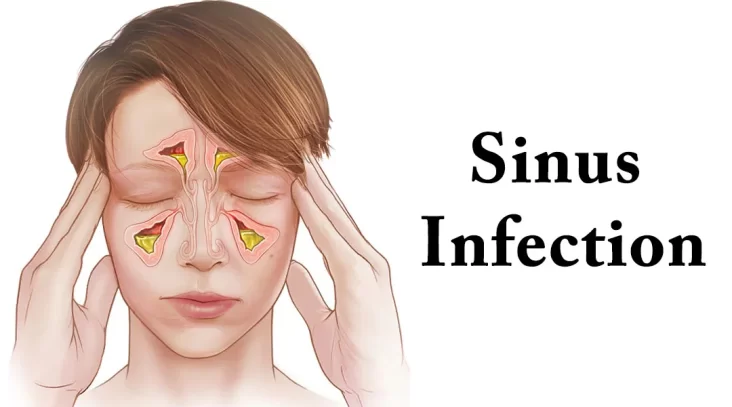A sinus infection, medically known as sinusitis, refers to inflammation or swelling of the tissue lining the sinuses. Sinuses are hollow cavities in the skull, located around the eyes, cheeks, nose, and forehead. They produce mucus, which helps to trap dust, bacteria, and other particles in the air we breathe. When the sinuses become inflamed or infected, they can cause discomfort and a range of symptoms. Here’s an in-depth look at sinus infections:
Types of Sinus Infections
- Acute Sinusitis: This type lasts for a short period, usually less than four weeks. It often follows a cold or upper respiratory infection and resolves on its own with appropriate treatment.
- Chronic Sinusitis: When symptoms persist for more than 12 weeks despite medical intervention, it’s considered chronic sinusitis. This form may require more extensive treatment and management.
Causes of Sinus Infections:
- Viral Infections: Most sinus infections start as viral infections, such as the common cold or flu. Viruses can cause inflammation of the sinus lining, leading to congestion and blockage of the sinus openings.
- Bacterial Infections: Bacterial sinusitis may occur when bacteria infect the blocked sinuses, leading to a secondary bacterial infection. This typically happens following a viral infection when the sinuses are already inflamed and congested.
- Allergies: Allergic reactions to pollen, dust mites, pet dander, or other allergens can trigger inflammation in the sinuses, leading to sinusitis, especially in people prone to allergies.
- Nasal Polyps: These noncancerous growths in the nasal passages or sinuses can obstruct the normal flow of mucus, leading to chronic inflammation and recurrent sinus infections.
- Deviated Septum: A deviated septum, where the wall between the nostrils is crooked or shifted, can block sinus passages and impede drainage, increasing the risk of sinus infections.
Symptoms of Sinus Infections:
- Nasal Congestion: Difficulty breathing through the nose due to swollen nasal passages and mucus buildup.
- Facial Pain or Pressure: Pain or pressure around the eyes, cheeks, forehead, or nose, often worsening when bending forward or lying down.
- Headache: A dull, throbbing pain in the forehead, temples, or behind the eyes, commonly associated with sinus infections.
- Nasal Discharge: Thick, discoloured mucus draining from the nose or down the throat, often with a foul odour or taste.
- Cough: A persistent cough, especially at night, as mucus drips down the throat and irritates the airways.
- Sore Throat: Postnasal drip can lead to throat irritation and discomfort.
- Reduced Sense of Smell or Taste: Inflammation and congestion can interfere with the ability to smell or taste properly.
- Fatigue: Feeling tired or run down, often due to disrupted sleep from nasal congestion or discomfort.
Diagnosis and Treatment:
- Medical History and Physical Exam: A healthcare provider will inquire about symptoms, and medical history, and perform a physical examination to assess for signs of sinusitis.
- Imaging Studies: In some cases, imaging tests such as CT scans or nasal endoscopy may be recommended to visualize the sinuses and assess for structural abnormalities or blockages.
- Nasal Swab or Culture: If bacterial sinusitis is suspected, a nasal swab or culture may be performed to identify the specific bacteria causing the infection and guide antibiotic therapy.
Treatment Options:
- Antibiotics: If the sinus infection is bacterial, antibiotics may be prescribed to clear the infection.
- Decongestants: Over-the-counter or prescription decongestants can help reduce nasal congestion and improve sinus drainage.
- Steroid Nasal Sprays: These medications help reduce inflammation in the nasal passages and sinuses, alleviating symptoms.
- Saline Nasal Irrigation: Rinsing the nasal passages with a saline solution can help flush out mucus and allergens, promoting sinus drainage.
- Pain Relievers: Over-the-counter pain relievers such as ibuprofen or acetaminophen can help alleviate headache and facial pain associated with sinusitis.
- Nasal Corticosteroids: Prescription nasal sprays containing corticosteroids may be recommended for chronic sinusitis or to manage nasal polyps.
- Allergy Management: Avoiding allergens and using allergy medications or immunotherapy can help prevent allergic reactions that contribute to sinusitis.
- Surgery: In severe or recurrent cases of chronic sinusitis, surgery may be considered to remove nasal polyps, correct a deviated septum, or widen the sinus openings to improve drainage.
Prevention:
- Practice Good Hand Hygiene: Wash hands frequently with soap and water to reduce the spread of viruses and bacteria that can cause sinus infections.
- Avoid Irritants: Minimize exposure to cigarette smoke, air pollution, and other environmental irritants that can trigger sinus inflammation.
- Stay Hydrated: Drink plenty of fluids to keep nasal passages moist and promote proper drainage.
- Use Humidifiers: Humidifiers can add moisture to the air, helping to alleviate dry nasal passages and reduce congestion.
- Manage Allergies: Identify and avoid allergens that trigger allergic reactions, and use allergy medications or treatments as recommended by a healthcare provider.
- Practice Nasal Irrigation: Regularly rinse the nasal passages with a saline solution to remove mucus, allergens, and irritants.
In conclusion, sinus infections can be uncomfortable and disruptive, but with proper diagnosis and treatment, most cases can be effectively managed. Our team of medical experts at Sujata Birla Hospital suggests that it’s essential to seek medical attention if symptoms persist or worsen, especially if accompanied by fever, severe headache, or vision changes, as these may indicate a more serious underlying condition requiring prompt medical evaluation.

